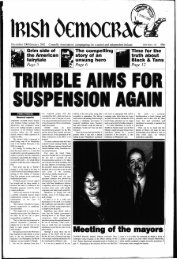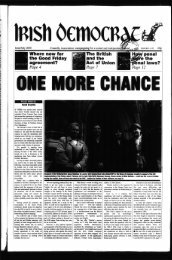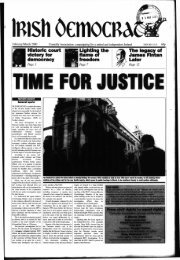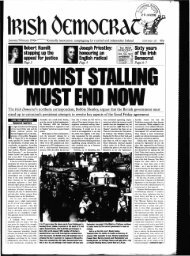Irish Democrat April 1992
You also want an ePaper? Increase the reach of your titles
YUMPU automatically turns print PDFs into web optimized ePapers that Google loves.
if^W-to LVMf. -<br />
INSIGHT<br />
I<br />
INSIGHT<br />
Ireland's abortion<br />
debacle leaves<br />
politicians in a<br />
pickle<br />
The Dublin<br />
establishment has<br />
unwittingly<br />
thrown the<br />
outcome of the<br />
Maastricht<br />
referendum into<br />
serious doubt by<br />
allowing a young<br />
rape victim to<br />
travel to England<br />
for an abortion<br />
explains<br />
ANTHONY<br />
COUGHLAN<br />
reasons for their judgement<br />
sent a torpedo through the<br />
<strong>Irish</strong> Constitutional Article<br />
40.3.3, adopted by referendum<br />
of the people in 1983, that forbids<br />
abortion in the <strong>Irish</strong> State.<br />
This constitutional Article<br />
recognises "the right to life of<br />
the unborn" and pledges the<br />
state to safeguard that right by<br />
its laws "as far as practicable",<br />
with equal regard to the right<br />
to life of the mother. Up to now<br />
everyone took this to mean<br />
that legal abortion is constitutionally<br />
outlawed in Ireland<br />
except in cases where the<br />
mother's physical life might be<br />
threatened by an ectopic or<br />
cancerous pregnancy, when<br />
the foetus may legally be<br />
sacrificed in order to prevent<br />
the mother's death. But the<br />
Supreme Court decided that in<br />
the "X" case the mother's life<br />
was endangered by her threat<br />
to commit suicide if she was<br />
not permitted to terminate her<br />
pregnancy. The court decided<br />
that this threat justified permitting<br />
her to have an abortion<br />
if she wanted to travel to<br />
Britain for that purpose. On<br />
that reasoning they lifted the<br />
injunction and the young<br />
woman is understood to have<br />
IRELAND'S abortion ban,<br />
the country's constitutional<br />
referendum on the<br />
ratification of the<br />
Maastricht Treaty and subsequently aborted the<br />
Brussels' carefully laid plans foetus in a British clinic.<br />
for a new Superpower As the old <strong>Irish</strong> legal tag<br />
European Union are now goes, the Constitution means<br />
thrown together in a political what the Supreme Court says<br />
witches brew following the it means. It must also be interpreted<br />
in the present tense. So<br />
' .ish SupremeCourt's decision<br />
on the recent abortion case, on the face of it the "X" case<br />
known in Dublin legal circles judgement seems overnight to<br />
as "Attorney-General versus shift Ireland from being a<br />
X".<br />
country where there is the<br />
"X" is a young rape victim strictest possible ban on abortion<br />
to one of having — at least<br />
whose parents consulted the<br />
police about an alleged rape, in some respects — the most<br />
indicating that their daughter liberal abortion laws in<br />
intended going to Britain for Europe. For the logic of the<br />
an abortion to terminate her Supreme Court judgement is<br />
pregnancy. The police consulted<br />
the Attorney-General, that she intends to commit<br />
that a woman need only say<br />
who judged that he had no option<br />
but to seek to prevent her legal abortion. Moreover<br />
suicide to entitle her to have a<br />
travelling abroad fora purpose anyone else may legally carry<br />
which in <strong>Irish</strong> law is totally illegal.<br />
He secured an injunction during a pregnancy { on the plea<br />
out an abortion at any time<br />
preventing "X" going to<br />
that they believed in good faith<br />
Britain, which the High Court<br />
that the mother's life was endangered<br />
by her threat of<br />
then upheld, but which was<br />
overturned by a majority<br />
suicide if-the pregnancy continued.<br />
judgement of the Supreme<br />
Court The Supreme Court<br />
The judges of the Supreme<br />
said "X" could travel, but the<br />
Court roundly ticked off<br />
IRISH DEMOCRAT <strong>April</strong> 19 9 2 page 6<br />
Ireland's politicians for not<br />
legislating on the application<br />
of the constitutional amendment<br />
since it was originally<br />
adopted in 1983. And they<br />
threw in for good measure<br />
another political time-bomb<br />
for the <strong>Irish</strong> Government by<br />
stating that, although they<br />
lifted the travel injunction in<br />
the "X" case, the Courts did<br />
have the power to prevent<br />
people going abroad for an<br />
abortion if health or social<br />
reasons were the reasons for<br />
travelling rather than what<br />
had to do with preserving the<br />
woman's actual life. They thus<br />
served notice that there was no<br />
absolute constitutional right to<br />
travel abroad under either<br />
<strong>Irish</strong> or European law.<br />
The<br />
Maastricht<br />
protocol<br />
That impinges significantly on<br />
Brussels. For European law<br />
and the "European Union"<br />
proposed at Maastricht makes<br />
everyone legally "European<br />
citizens" for the first time, in<br />
addition to being citizens of<br />
their own country. Brussels<br />
and the EC Court have their<br />
own code of fundamental<br />
rights, which override national<br />
law in case of conflict. It is because<br />
of this that those cynical<br />
<strong>Irish</strong> politicians, Messrs<br />
Haughey and Collins, inserted<br />
a protocol or addendum to the<br />
Maastricht Treaty last December<br />
reserving Ireland's special<br />
position on abortion and<br />
protecting the relevant <strong>Irish</strong><br />
constitutional Article from interference<br />
by the EC Court. The<br />
protocol stated: "Nothing in<br />
the Treaty on European Union<br />
or in the Treaties establishing<br />
the European Communities, or<br />
in the Treaties or Acts modifying<br />
or supplementing those<br />
Treaties, shall affect the application<br />
in Ireland of Article<br />
40.3.3. of the Constitution of<br />
Ireland."<br />
But now, because of the "X<br />
"case, the country's constitutional<br />
position on abortion is<br />
significantly different from<br />
what it was generally before<br />
then taken to be. Messrs<br />
Haughey and Collins' halfbaked<br />
protocol, which they<br />
inserted without an iota of<br />
public discussion or consultation<br />
— and which the<br />
Europeans accepted without<br />
difficulty as a sop to Ireland's<br />
special sensibilities in this area<br />
— has blown up in the face of<br />
the new <strong>Irish</strong> government led<br />
by Taoiseach Reynolds and<br />
Foreign Minister Andrews.<br />
The irony is that the<br />
protocol which was inserted to<br />
appease fundamentalist "Pro-<br />
Life" opinion in the Fianna F3il<br />
Party looks like alienating<br />
liberal, "pro-choice" opinion<br />
instead. For the liberals are indignant<br />
at the threat to the<br />
right to travel and they also<br />
want recognition of a "right to<br />
information" in Ireland about<br />
European abortion services.<br />
For abortion is legally a "service"<br />
throughout the rest of the<br />
EEC and there have been<br />
several contentious court<br />
judgements in Ireland in<br />
recent years, based on the<br />
constitution's abortion article,<br />
which have restricted the advertising<br />
of foreign abortion<br />
services or the provision of<br />
abortion counselling in clinics.<br />
And so Messrs Reynolds<br />
and Andrews have set out to<br />
get the eleven other EC States<br />
to agree to alter the <strong>Irish</strong><br />
protocol, although the Treaty<br />
was signed in early February<br />
and it has been sent off for<br />
ratification to all the other<br />
Member States. They want an<br />
addendum to the protocol to<br />
read: "This Protocol shall not<br />
limit freedom to travel between<br />
Member States or to<br />
obtain, in Ireland, information<br />
relating to services lawfully<br />
available in Member States."<br />
Of course, the treat cannot<br />
come into force anywhere unless<br />
it is ratified by all. If it is<br />
rejected in Ireland or any other<br />
State the treaty falls and the<br />
entire "European Union"<br />
scheme is scuppered. Thus<br />
great issues hang on the<br />
ratification process in each<br />
country. They are especially<br />
important in Ireland and Denmark,<br />
where the ordinary<br />
people have the f;.ial say.<br />
Everywhere else a parliamen-<br />
I HAUGHEY: it's his protocol<br />
tary majority suffices for<br />
ratification.<br />
Luckily for the <strong>Irish</strong> government<br />
no state has ratified the<br />
treaty yet, as otherwise not a jot<br />
or tittle of it could be changed<br />
The trouble is that in countries<br />
other than Ireland the more<br />
people learn about Maastricht<br />
and "European Union", the<br />
more concerned and alarmed<br />
they are becoming. This is<br />
especially the case in Germany,<br />
where the penny has<br />
dropped with public opinion<br />
that if "European Union" goes<br />
through there will be an end to<br />
the precious Deutschmark in a<br />
few short years. It has been<br />
said that for the Germans their<br />
one major achievement in this<br />
century of Kaiser Wilhelm,<br />
Hitler and Auschwitz is the<br />
Deutschmark, symbol of a<br />
mighty and prosperous<br />
economy. Now Messrs Kohl<br />
and Genscher, without any<br />
more public discussion about<br />
the significance of the<br />
Maastricht Treaty than the<br />
politicians permitted in<br />
Ireland, have agreed that the<br />
D-Mark should be replaced by<br />
a new currency, a thing called<br />
the "ecu" — to German ears, a<br />
horrible French-sounding<br />
word at that — which<br />
Maastricht ordains is to become<br />
the common currency of<br />
the proposed "European<br />
Union" by January 1999 at the<br />
latest. And to add to German<br />
public indignation, Jacques<br />
Delors and the Brussels Commission<br />
— those "technocrats<br />
without a country, responsible<br />
to no one", as Charles De<br />
Gaulle once called them —<br />
seem to expect that Germany,<br />
which is at present groaning<br />
under the economic burden of<br />
preventing total collapse in the<br />
former GDR, will shell out<br />
large sums of money to the<br />
poorer EC states to subsidise<br />
them as they bear the strains of<br />
making their currencies as<br />
strong as the D-Mark over the<br />
next few years, in order to<br />
prepare for European<br />
Monetary Union at the end of<br />
the decade. Not surprisingly,<br />
German public opinion is in<br />
revolt against European<br />
Economic and Monetary<br />
Union and the whole<br />
Maastricht federal project as<br />
these facts sink home. In the<br />
light of this more and mote<br />
people think the EMU project<br />
is inevitably doomed because<br />
politically impossible, irrespective<br />
of whether the<br />
Maastricht Treaty is ratified.<br />
Bishops'<br />
condemnation<br />
In Denmark, whose referendum<br />
on Maastricht is fixed for<br />
2 June, people say that they<br />
would like to revise the Danish<br />
protocol relating to foreigners<br />
buying second,homes in their<br />
country, if the <strong>Irish</strong> are permitted<br />
to alter theirs. And<br />
there are 15 other protocols —<br />
some containing vitally important<br />
material of interest to<br />
many countries. For example,<br />
the statute of the proposed<br />
European Central Bank is contained<br />
in a protocol.<br />
Quite a lot of people in fact,<br />
all over Europe, would be absolutely<br />
delighted if<br />
Maastricht could be destroyed<br />
by this whole protocol affair:<br />
And they would doubtless be<br />
quite happy also to put the<br />
blame on Ireland and have its<br />
special problems with abortion<br />
as a handy pretext.<br />
Meanwhile, the Brussels Commission<br />
and the Eurocrats,<br />
who hope to run the<br />
"European Union" show, are<br />
aghast at the can of worms the<br />
<strong>Irish</strong> protocol business has<br />
opened up. They would like<br />
Ireland to withdraw the<br />
protocol altogether rather than<br />
create a precedent for others<br />
trying to raise issues of special<br />
interest to them, so possibly<br />
reopening the whole treaty for<br />
renegotiation. But if the <strong>Irish</strong><br />
government agrees to that they<br />
give ultimate jurisdiction over<br />
all Ireland's fundamental<br />
rights to the European Court<br />
and European law. Not only<br />
would that affect the abortion<br />
position, but quite a lot of<br />
people these days are becoming<br />
genuinely concerned that<br />
the way things are going in<br />
Western Europe today, with its<br />
ageing population, a "right to<br />
euthanasia" could in time become<br />
generalised throughout<br />
>: wants new protocol<br />
the EEC through the<br />
jurisprudence of the EC Court<br />
of Justice, and sending aged<br />
relatives to other EC countries<br />
for euthanasia "services"<br />
could become a legal entitlement<br />
in European law.<br />
The <strong>Irish</strong> Catholic hierarchy<br />
has condemned the Supreme<br />
Court judgement for permitting<br />
abortion in certain cases.<br />
This will in time open the<br />
floodgates to universal abortion<br />
on demand in Ireland, say<br />
the <strong>Irish</strong> Bishops, pointing to<br />
the experience of other<br />
countries. Outraged Pro-Life<br />
opinion in the Fianna Fail<br />
party and more widely is already<br />
demanding thatanother<br />
constitutional referendum be<br />
held to dose the loophole the<br />
Supreme Court judgement has<br />
opened. It is probable that<br />
Fianna F4il, the majority party<br />
in government, will have to<br />
concede this, though the<br />
party's top politicians are most<br />
reluctant. If they do not, Pro-<br />
Life supporters will be inclined<br />
to vote against the Maastricht<br />
Treaty, for they are now dissatisfied<br />
with the<br />
constitutional article the<br />
Maastricht protocol purports<br />
to protect.<br />
On the other hand, if the<br />
government does concede<br />
another abortion referendum,<br />
it will cause division between<br />
Fianna Fiil and its Progressive<br />
<strong>Democrat</strong> partners in Dublin's<br />
coalition government, who<br />
lean to the pro-choice side on<br />
the issue. The <strong>Irish</strong> opposition<br />
parties, Labour and Fine Gael,<br />
also lean to the liberal side. So<br />
another bitter and divisive<br />
referendum on abortion is<br />
quite likely in Ireland between<br />
now and the Maastricht<br />
referendum that is also necessary.<br />
The latter, originally<br />
scheduled for June, looks likely<br />
now to be put back to July.<br />
Possibly it will not be held until<br />
much later in the year, as<br />
Ireland's politicians tussle<br />
with their abortion problem.<br />
Meanwhile the Republic's unemployment<br />
problem heads<br />
for the 300,000 mark — onequarter<br />
of the labour force in<br />
the state — as the politicians<br />
dare to advocate the<br />
Maastricht Monetary Union<br />
scheme that will certainly<br />
make the country's unemployment<br />
and emigration much<br />
worse.<br />
A special <strong>Irish</strong> constitutional<br />
referendum on abortion will<br />
in turn impinge on Maastricht,<br />
for the losing side in such a<br />
referendum will transfer their<br />
ire to the protocol that seeks to<br />
copperfasten and preserve<br />
from European law whatever<br />
the constitutional position on<br />
abortion then may be.<br />
Contemptible<br />
cre^A^ •• jjc'-.<br />
Thus the rather contemptible<br />
crew of party politicians who<br />
rule the Republic have got a<br />
right mess on their hands. The<br />
ideal situation from the point<br />
of view of democrats opposed<br />
to "European Union" would<br />
be if Ireland's "Pro-Life"<br />
people voted "No" in the<br />
Maastricht referendum for one<br />
set of reasons and the "prochoice"<br />
people voted "No" for<br />
another set. That would mean<br />
the entire reactionary project<br />
would be scuppered once and<br />
for all, to Ireland's benefit and<br />
that of all of Europe's peoples.<br />
That conjuncture may be<br />
too good to happen, but one<br />
way or another it is now virtually<br />
inevitable that the<br />
Republic's referendum on<br />
"European Union" will be interwoven<br />
with the abortion<br />
question, which threatens to<br />
become a "loose cannon" outside<br />
the control of the<br />
country's party politicians. Of<br />
course this development<br />
threatens to distract attention<br />
from all the other huge issues<br />
involved. The Maastricht<br />
Treaty is 100 pages long and<br />
contains several hundred new<br />
or amended articles to the existing<br />
EC treaties. Ireland's<br />
abortion controversy relates to<br />
a one-sentence appended<br />
protocol. That puts all the<br />
greater responsibility on the<br />
forces of democracy and<br />
progress in Ireland to make<br />
sure that these other issues are<br />
not lost sight of in the coming<br />
months, but are brought<br />
vigorously to the fore in the<br />
' E Y E W I T N E S S<br />
Six women hold a<br />
The Northern<br />
Ireland Office is<br />
turning a blind<br />
eye to the<br />
violation of<br />
women's rights<br />
in Maghaberry<br />
jail, argues<br />
IRENE<br />
SHERRY<br />
INCE stripsearching of<br />
women prisoners was<br />
introduced in Armagh<br />
prison in 1982, the practice<br />
has been used as another<br />
method of repression in an<br />
attempt to demoralise and<br />
weaken women prisoners.<br />
The Northern Ireland Office<br />
and the prison<br />
administration have consistently<br />
ignored<br />
recommendations from independent<br />
doctors that<br />
stripsearching should be<br />
ended because of the<br />
psychological effect it has<br />
on women. Consultant<br />
psychiatrist Derek Russell-<br />
Davis said that<br />
"stripsearching must stop<br />
before lasting damage is<br />
done to the women whose<br />
bodies are continually being<br />
violated." Professor Ivor<br />
Browne of University College<br />
Dublin's psychiatry<br />
department, who has also<br />
constantly spoken out<br />
against stripsearching, says<br />
it is "a rather violent procedure<br />
and a tremendous<br />
intrusion on a human<br />
being". He says he has<br />
spoken to several of the<br />
women who've undergone<br />
this procedure and there<br />
doesn't even seem to be a<br />
reasonable security purpose<br />
for doing it<br />
Stripsearching was introduced<br />
on the pretext of a<br />
trivial ihddent in October<br />
1982 when two young offenders<br />
being held on<br />
remand for non-political offences<br />
were caught taking<br />
two keys into the jail as a<br />
prank after a court appearance.<br />
The keys were<br />
found during a normal "rub<br />
down " search after the RUC<br />
contacted the prison.<br />
In the beginning, stripsearching<br />
mainly affected<br />
woman pinned<br />
on the floor...<br />
remand prisoners as they<br />
were stripsearched before<br />
and after each remand or<br />
court appearance. Sentenced<br />
prisoners were subjected to<br />
the procedure any time they<br />
had to leave or re-enter<br />
prison on inter-prison visits,<br />
hospital visits or compassionate<br />
paroles. Pregnant<br />
women and Women who<br />
were menstruating had to<br />
undergo strip searches and<br />
one woman returning from<br />
hospital after suffering the<br />
trauma of a miscarriage had<br />
to endure a stripsearch.<br />
In the early stages, the<br />
women strongly resisted<br />
any attempt to stripsearch<br />
them, which led to them<br />
being forcibly restrained<br />
and their clothes being torn<br />
off. Catherine Moore was injured<br />
during one such<br />
assault when a towel was<br />
forced over her eyes and her<br />
clothes torn off. She later<br />
suffered severe disciplinary<br />
measures on charges<br />
brought against her for assaulting<br />
the warders<br />
involved.<br />
The late Cardinal<br />
O'Fiich appealed to the.<br />
British government just four<br />
days before the opening of<br />
Maghaberry to "end this objectionable<br />
practice" and to<br />
base the new regime on "a<br />
system more fully in accord<br />
with human dignity".<br />
On 18 March 1986, the<br />
women were moved from<br />
Armagh to the new high<br />
security prison Maghaberry.<br />
In the first month after<br />
being transferred, 17 strip<br />
searches were carried out on<br />
remand prisoners which<br />
rose to 210 at the end of six<br />
months despite the fact that<br />
Maghaberry cost £30 million<br />
to build and a further £5 million<br />
was spent on security<br />
measures.<br />
Accounts from prisoners<br />
paint a very disturbing picture<br />
of how strip searches<br />
are carried out and the effects<br />
they have upon them.<br />
"A prisoner is brought to<br />
a cubicle in the reception<br />
area and told to remove her<br />
clothes and hand them to the<br />
warders who thoroughly examine<br />
each item. Cynical<br />
comments are made about<br />
the women's clothing and<br />
her body. Menstruating<br />
women are forced to remove<br />
their sanitary protection for<br />
inspection.<br />
"The prisoner is then<br />
visually scrutinised. They<br />
are ordered to turn round<br />
while their backs are examined<br />
and the warder runs<br />
• ©F5L.«;' "<br />
her fingers through the<br />
prisoner's hair. The palms of<br />
their hands are turned over<br />
for inspection and their legs<br />
are lifted to inspect the soles<br />
of their feet. If a woman<br />
refuses to comply with a<br />
strip search she can have her<br />
clothes forcibly removed by<br />
up to 15 prison warders and<br />
then the prisoner can be<br />
charged with assault and put<br />
in solitary confinement."<br />
The NIO claim that strip<br />
searches are carried out with<br />
sensitivity. But in a statement<br />
to an independent<br />
public tribunal, women<br />
prisoners strongly contradicted<br />
this: "What kind of<br />
sensitivity is displayed<br />
when one is ordered to strip<br />
completely naked in a hostile<br />
atmosphere and in the<br />
presence of equally hostile<br />
jailers? How sensitively can<br />
one order another to comply<br />
to a frontal and rear visual<br />
inspection of their naked<br />
bodies?"<br />
A disturbing new trend<br />
was noted by women<br />
prisoners when two were<br />
stripsearched after visits —<br />
which had not previously<br />
happened — when prison<br />
staff alleged that they had<br />
"seen something" being<br />
passed. On the basis of these<br />
fabrications, strip searches<br />
were sanctioned and when<br />
the women voiced their concern<br />
at this sinister new<br />
development afterwards,<br />
their protests were dismissed.<br />
Pauline Quinn was<br />
returning from a compassionate<br />
visit when she was<br />
called into reception on 26<br />
<strong>April</strong> 1991. This was a very<br />
harrowing time for Pauline<br />
as her grandfather had just<br />
been buried that morning<br />
and previously on Sunday 3<br />
March, her brother John and<br />
three friends, Dwayne O'-<br />
Donnell, Malcolm Nugent<br />
and Tommy Armstrong had<br />
been brutally gunned down<br />
by loyalist paramilitaries<br />
outside Boyle's pub in Cappagh,<br />
Co Tyrone.<br />
On arrival at reception,<br />
Pauline was told she would<br />
be stripsearched. She asked<br />
to see the governor in an attempt<br />
to ascertain the reason<br />
why the stripsearch was<br />
being carried out but her request<br />
was refused. Pauline<br />
was then locked in a small<br />
room inside reception. She<br />
stood with her hands on the<br />
bars at the window to try<br />
and protect herself. At this<br />
point she was set upon by<br />
eight screws. She was<br />
dragged to the floor, her<br />
clothes forcibly removed<br />
and she was pinned down<br />
naked on the floor. The socalled<br />
medical officer<br />
removed a sanitary towel<br />
from Pauline, took it aside<br />
and searched it. At this stage<br />
Pauline was still on the floor<br />
and extremely distressed because<br />
the screws involved<br />
had verbally and physically<br />
abused her and stripped her<br />
naked. The medical officer<br />
told Pauline to open her legs<br />
which she refused to do,<br />
feeling particularly disgusted<br />
at the suggestion.<br />
The officer then opened<br />
Pauline's legs herself and<br />
searched between them and<br />
then ordered the other<br />
screws to "turn her over",<br />
parted the cheeks of her behind<br />
and searched her anus.<br />
The other women on thew<br />
wings could hear Pauline's<br />
screams and shouts but were<br />
unable to assist her.<br />
Pauline was naturally<br />
very distressed, vomited<br />
throughout the evening, and<br />
had to receive medicatidn<br />
from the doctor to each the<br />
pain and try and relax her.<br />
After this brutal attack,<br />
she made a compliant via the<br />
prison governor and was<br />
told an inquiry would take<br />
place and that the outcome<br />
would be made fully known<br />
to her. On this basis, Pauline<br />
co-operated fully with the<br />
investigation which took<br />
place on 2 May 1991. Since<br />
the investigation, she has<br />
been told that the result of<br />
the inquiry will not be made<br />
known to her.<br />
The women in<br />
Maghaberry jail now<br />
believe there was a total<br />
cover-up in the inquiry and<br />
that the NIO and the jail administration<br />
never intended<br />
to hold an impartial investigation.<br />
Pauline participated in<br />
the inquiry because she<br />
didn't want any other<br />
woman prisoner to be subjected<br />
to such degrading<br />
treatment again. The refusal<br />
of the prison authorities to<br />
issue the result of the investigation<br />
further<br />
demonstrates that the<br />
British administration will<br />
go to any lengths to repress<br />
republican prisoners.<br />
Stripsearching hasn't<br />
generated such a tense atmosphere<br />
of hostility in the<br />
prison since the early 1980s.<br />
It is now quite apparent that<br />
the NIO are prepared to let<br />
this situation continue and<br />
indeed worsen.<br />
IRISH DEMOCRAT <strong>April</strong> 19 92<br />
a ,r..-ffc' ni^iii'iiiiint' in<br />
- "-TajBtf^Tiliriillff!!.»rMII«lMllltllfil •<br />
miii<br />
Jiakt'Si

















